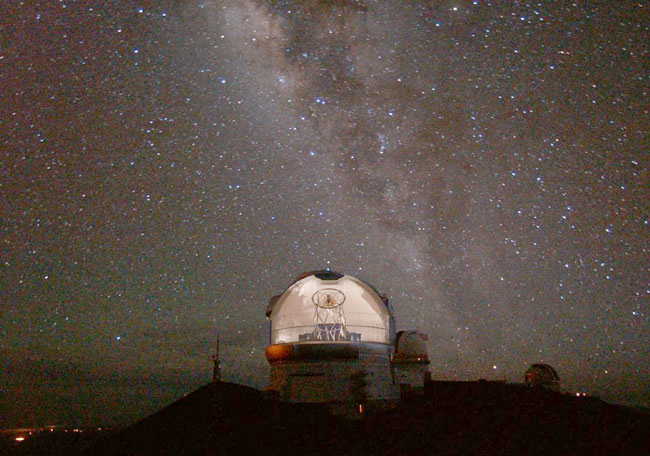Credit & Copyright: Gemini Observatory,
Peter Michaud & Kirk Pu'uohau-Pummill
Explanation:
Where will Gemini take us tonight?
It is dusk and Gemini North,
one of the largest telescopes on
planet Earth,
prepares to peer into the distant universe.
Gemini's flexible 8.1-mirror
has taken already effectively taken humanity to
distant stars,
nebulas,
galaxies, and
quasars, telling us about the geometry,
composition, and evolution of our universe.
The above picture is actually a composite of over
40 images taken while the Gemini dome rotated,
later adding an image of the star field taken
from the same location.
The Gemini dome is not transparent -- it only appears so
because it rotated during the exposures of this image.
The constellations of
Scorpius and Sagittarius can be seen above the dome, as well as the
sweeping band of our
Milky Way Galaxy,
including the direction toward the
Galactic center.
Gemini North's twin,
Gemini South,
resides in Cerro Pachn,
Chili.
This night, 2003 August 19,
Gemini North
took us only into the outer
Solar System,
observing
Pluto
in an effort to better determine the composition of its
thin atmosphere.
1999 2000 2001 2002 2003 2004 2005 2006 2007 2008 2009 2010 2011 2012 2013 2014 2015 2016 2017 2018 2019 2020 2021 2022 2023 2024 2025 2026 |
Yanvar' Fevral' Mart Aprel' Mai Iyun' Iyul' Avgust Sentyabr' Oktyabr' Noyabr' Dekabr' |
NASA Web Site Statements, Warnings, and Disclaimers
NASA Official: Jay Norris. Specific rights apply.
A service of: LHEA at NASA / GSFC
& Michigan Tech. U.
|
Publikacii s klyuchevymi slovami:
Mauna Kea - Gemini - Milky Way - Teleskopy opticheskie - Mlechnyi Put' - Dzhemini-Sever
Publikacii so slovami: Mauna Kea - Gemini - Milky Way - Teleskopy opticheskie - Mlechnyi Put' - Dzhemini-Sever | |
Sm. takzhe:
Vse publikacii na tu zhe temu >> | |
